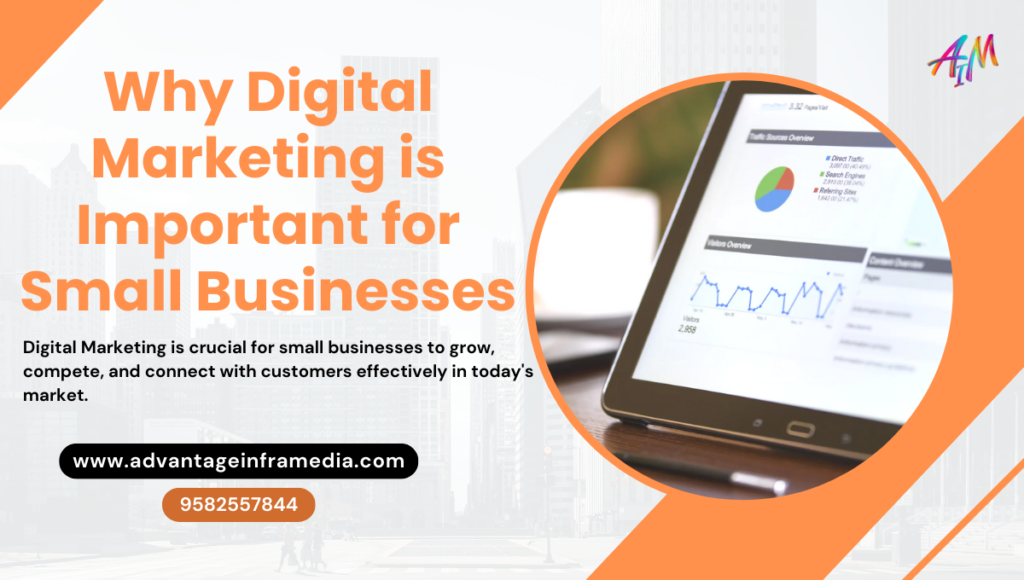Introduction
In today’s digitally-driven world, businesses of all sizes must adapt to the changing landscape to stay competitive. For small businesses, the challenge is even greater. With limited resources, smaller customer bases, and a need to stand out among more established competitors, digital marketing has become not just a luxury but a necessity. This blog will explore why digital marketing is crucial for small businesses and how it can be the key to sustainable growth and success.
1. Cost-Effective Marketing
Traditional marketing methods such as print ads, billboards, and TV commercials can be prohibitively expensive for small businesses. Digital marketing, on the other hand, offers cost-effective alternatives that can fit almost any budget. Whether it’s social media advertising, email campaigns, or search engine optimization (SEO), small businesses can reach their target audience without breaking the bank.
- Pay-per-click (PPC) Advertising: Platforms like Google Ads allow businesses to set a budget and only pay when someone clicks on their ad. This means every dollar spent is directly contributing to attracting potential customers.
- Social Media Advertising: With platforms like Facebook, Instagram, and Twitter, small businesses can create highly targeted ads, ensuring that their marketing efforts are reaching the right people.
- Email Marketing: Building and nurturing an email list allows small businesses to communicate directly with their audience at a fraction of the cost of traditional marketing methods.
2. Targeted Audience Reach
Digital marketing allows small businesses to target their audience with precision. Unlike traditional marketing, which often relies on a broad, generalized approach, digital marketing enables businesses to tailor their message to specific demographics, interests, and behaviors.
- SEO and Content Marketing: By optimizing their website for search engines, small businesses can attract organic traffic from users actively searching for products or services like theirs. Content marketing, such as blogging or video content, can further engage this audience and build trust.
- Social Media Targeting: Social media platforms offer advanced targeting options, allowing businesses to reach specific age groups, locations, interests, and even behaviors. This ensures that marketing efforts are not wasted on uninterested parties.
- Retargeting: This strategy allows businesses to re-engage users who have already interacted with their website or ads, increasing the chances of conversion.
3. Building Brand Awareness
For small businesses, building brand awareness is crucial. Digital marketing offers a variety of ways to increase visibility and establish a brand identity.
- Social Media Presence: Regularly posting on social media platforms and engaging with followers can help build a loyal customer base. Sharing content that resonates with the audience can also lead to shares and recommendations, further increasing brand exposure.
- Content Marketing: Creating valuable content that addresses the needs and interests of potential customers can position a small business as an authority in its industry. This not only builds trust but also encourages repeat visits to the website.
- Influencer Marketing: Partnering with influencers who align with the brand can introduce the business to a broader audience, helping to build credibility and awareness.
4. Measurable Results and Analytics
One of the significant advantages of digital marketing is the ability to measure and analyze results. Unlike traditional marketing, where it’s challenging to gauge the effectiveness of a campaign, digital marketing provides detailed analytics that can be used to refine strategies.
- Google Analytics: This tool allows businesses to track website traffic, user behavior, and conversion rates. By understanding how users interact with their site, businesses can make data-driven decisions to improve performance.
- Social Media Analytics: Platforms like Facebook and Instagram provide insights into post engagement, follower growth, and ad performance. This data can be used to optimize future campaigns.
- A/B Testing: Digital marketing enables businesses to test different versions of ads, landing pages, or emails to see which performs better. This continuous testing and refinement process leads to more effective marketing strategies.
5. Increased Customer Engagement
Digital marketing offers numerous opportunities for small businesses to engage with their customers, fostering relationships that lead to loyalty and repeat business.
- Social Media Interaction: Platforms like Facebook, Instagram, and Twitter allow businesses to interact with customers directly. Responding to comments, answering questions, and addressing concerns in real-time can enhance customer satisfaction and build trust.
- Email Marketing: Regularly sending out newsletters or promotional offers keeps the business top-of-mind for customers. Personalized emails based on customer behavior can also lead to higher engagement rates.
- Live Chat and Messaging Apps: Implementing live chat on the website or using messaging apps like WhatsApp or Facebook Messenger allows businesses to provide instant customer support, improving the overall customer experience.
6. Competitive Advantage
In a crowded marketplace, small businesses need to differentiate themselves from their competitors. Digital marketing offers several ways to gain a competitive edge.
- SEO Optimization: By optimizing their website for search engines, small businesses can outrank their competitors in search results, attracting more organic traffic.
- Content Marketing: Providing valuable content that addresses customer pain points can position a business as an industry leader, making it the go-to source for information and solutions.
- Social Proof: Online reviews, testimonials, and case studies can be powerful tools in building trust and credibility. Encouraging satisfied customers to leave positive reviews can help a small business stand out from the competition.
7. Flexibility and Adaptability
The digital marketing landscape is constantly evolving, and small businesses must be flexible and adaptable to stay ahead of the curve. Digital marketing allows for quick adjustments to campaigns, ensuring that businesses can respond to changes in the market or customer behavior.
- Real-Time Adjustments: Unlike traditional marketing, where changes can be costly and time-consuming, digital marketing campaigns can be adjusted in real-time. Whether it’s tweaking an ad’s target audience or changing the messaging, businesses can quickly adapt to what’s working.
- Scalability: As a small business grows, digital marketing strategies can be scaled to reach a larger audience. Whether it’s increasing the budget for PPC ads or expanding content marketing efforts, digital marketing provides the flexibility to grow with the business.
- Staying Current: Digital marketing trends are always changing, from the rise of new social media platforms to updates in search engine algorithms. Small businesses that stay informed and adapt to these changes can maintain a competitive edge.
8. Global Reach with Local Focus
One of the unique advantages of digital marketing is the ability to reach a global audience while maintaining a local focus. Small businesses can target customers in their immediate area while also attracting interest from around the world.
- Local SEO: By optimizing their website for local search terms, small businesses can attract customers in their vicinity. This is especially important for businesses that rely on foot traffic or serve a specific geographic area.
- Global Marketing: With digital marketing, even the smallest business can reach customers on the other side of the world. This opens up opportunities for growth and expansion that would be impossible with traditional marketing methods.
- E-commerce Integration: For businesses that sell products online, digital marketing can drive traffic to their e-commerce site, increasing sales and revenue. With the right strategies, small businesses can compete on a global scale.
9. Customer Insights and Personalization
Digital marketing provides small businesses with valuable insights into customer behavior, preferences, and needs. This information can be used to create personalized marketing campaigns that resonate with the target audience.
- Customer Data: Tools like Google Analytics, social media insights, and CRM systems allow businesses to collect and analyze data on their customers. This data can be used to segment the audience and tailor marketing efforts to specific groups.
- Personalized Marketing: With the data collected, businesses can create personalized emails, ads, and content that speak directly to the needs and interests of individual customers. This level of personalization leads to higher engagement and conversion rates.
- Customer Feedback: Digital marketing channels provide an avenue for customers to share their feedback. Whether it’s through online reviews, social media comments, or survey responses, businesses can use this feedback to improve their products, services, and overall customer experience.
10. Sustainability and Long-Term Growth
Digital marketing is not just about short-term gains; it’s a sustainable strategy that can support long-term growth for small businesses. By building a strong online presence and continuously engaging with customers, small businesses can create a foundation for lasting success.
- Content Marketing: Creating evergreen content that remains relevant over time can continue to drive traffic and leads long after it’s published. This long-term approach ensures that the business continues to benefit from its marketing efforts.
- SEO: Investing in SEO can provide long-lasting results. As the website’s authority and ranking improve, the business will see sustained organic traffic growth, reducing the reliance on paid advertising.
- Brand Loyalty: By consistently providing value to customers through digital marketing, small businesses can build strong relationships that lead to repeat business and brand loyalty. This loyal customer base becomes a valuable asset for long-term growth.




